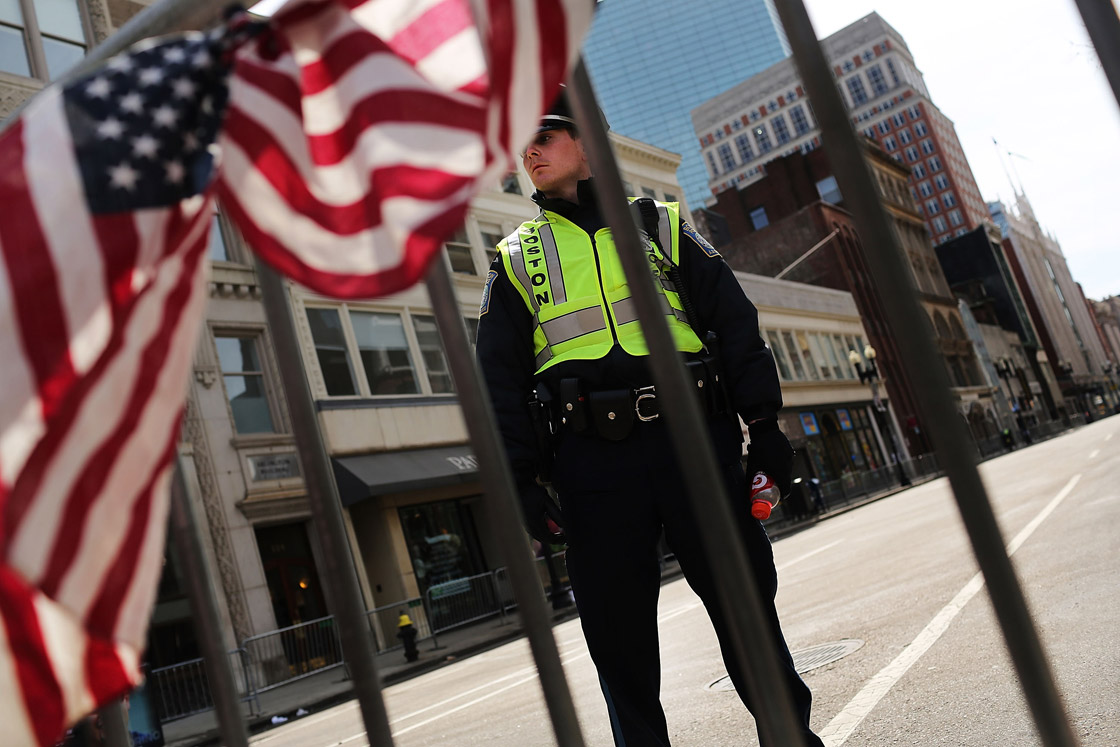BOSTON – On Monday I made my way through the throngs on Boylston Street, anxious to get a good view of the first wave of runners approaching the finish line at the Boston Marathon. Somehow I had forgotten one of my own rules picked up over a decade covering bombings in Israel: Avoid crowds.

A little over a year after relocating to low-key Boston, I had let my guard down. I no longer thought about crowds, no longer felt unsafe walking into a public building or event where no security person waited to check my bag.
I had already left the camaraderie and cheer of the marathon when I heard of the bombing. It was a few minutes after the attack and I put on the radio, an instinctive reflex from my Israel days where an attack was immediately followed by a succession of breathless updates. I flipped through the stations. But it took more than 20 minutes for an announcer to come on with the grim report: A pair of bombs, casualties rising. Blood on the pavement, body parts blown off.
A little over a year after relocating to low-key Boston, I had let my guard down. I no longer thought about crowds, no longer felt unsafe walking into a public building or event where no security person waited to check my bag.
I raced by subway to a nearby hospital, notebook and laptop in hand. But unlike Israel, no one on the T was chattering about the news, exchanging updates. I wasn’t even sure my fellow passengers had heard what happened.
At the Mass General Hospital, and later at Brigham and Women’s Hospital, I learned access to patients and information in a bombing’s aftermath was also different. Journalists were kept outside of the hospitals – none of the interviews or bedside access with patients and family members I was accustomed to in Israel, where both a culture of informality and a need to tell the world “our story” prevailed. Here, the focus is on patient privacy and rules.
At one of the hospitals I met a pair of friends, one a runner still in her shorts and marathon tag. They had come to see if they could help out.
Jay O’Brien, 41, had been walking towards his friend Kristen, who had recently finished the marathon, when he heard the first boom and mistook it for the sound of “a celebratory cannon.” After all, this was Patriot’s Day, commemorating the day the Revolutionary War was launched a few miles away in 1776.
“I don’t want to say it smelled like evil, but it did smell like destruction.”
“But there was a sense it was a little too loud for that. And when the second one hit, there was panic,” he said. White sulfur-smelling smoke filled the air and, with it, “a very uncommon smell. I don’t want to say it smelled like evil, but it did smell like destruction.”
O’Brien, a non-profit consultant from Cambridge and a marathon runner himself, watched the faces of the runners as they approached, just one-fifth of a mile away from the finish line.
“Some kept running. After 26 miles the brain tells you to keep going,” he said. Others grasped more quickly what was going on. “And they ran the other way.”
Tuesday, the day after the attack, the sun warmed the red brick brownstones and blooming dogwoods of Boston’s Backbay neighborhood bordering the marathon route. Streets were relatively empty. Yellow tape marked “Boston Police Department” cordoned off the blocks surrounding the bombing site. Some people left flowers; others, Boston t-shirts.
Beyond the tape, forensics teams searched for evidence. Police vehicles clogged the street. Strange, I thought. Following the bombings I had witnessed in Israel the broken glass, debris, and even the tiniest bits of human flesh were quickly cleaned up by a special unit of ultra-Orthodox men known as Zaka. Within hours of an attack, aside from a shattered storefront or burned awning, one might not even know what violence had just unfolded. In Israel the emphasis is on resilience – life goes on. Forensic evidence, while collected, is important, but it’s usually fairly clear who is behind an attack. Here in Boston, of course, there has been no claim of responsibility so any clues found near the bombing site are invaluable.
Knox Robinson, a 38-year-old New Yorker, wore his blue and yellow marathon medal and a pair of neon orange and green running shoes on a sun-dappled corner a few blocks from the site of the previous day’s bombing.
He’ll be back again, he said. “Because I’m a marathoner and this is what we do. A marathon on race day is the celebration of our passion and people have to understand it’s not going to change or stop because of an act of cowardice.”
Robinson publishes the magazine First Run and heads a running group called Black Roses of New York. For him the Boston Marathon is about symbolism as much as speed: The race begins on a two-lane road in the 300-year-old town of Hopkington, “and it finishes here in a street in one of America’s oldest cities. It’s special that way,” he said.
“I love the New York Marathon, but I’m in love with this race because I’m American.”
Dina Kraft is a freelance journalist and longtime foreign correspondent who has reported from Israel for the New York Times and Haaretz. She returned to the United States in 2012 as a Nieman fellow at Harvard University.



Comments